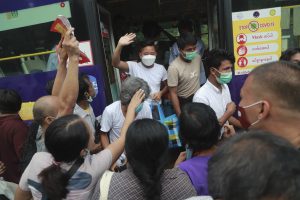U.S. State Department Counselor Derek Chollet was in Thailand, Singapore, and Indonesia this week to discuss the ongoing crisis in Myanmar. October has been an unusually busy month for the protracted political and humanitarian emergency, with ASEAN issuing a rare rebuke of military leader Min Aung Hlaing, legislation moving forward in the U.S. Congress, and a headline-grabbing amnesty of political prisoners by the junta. The United States now has a narrow opening to leverage diplomatic reach in the region and deliver meaningful relief for people on the ground – an opportunity that will be squandered if these recent developments are used to deflect and defer the international responsibility to respond.
After nine months of unrest following the February 1 military coup, Myanmar has descended into violent political gridlock. The junta, which wrested control from democratic leadership, has been unable to quell the resistance movement, while the People’s Defense Forces, which officially launched a defensive war on September 7, have largely succeeded in rendering Myanmar ungovernable to the military.
October saw a rare stretch of progress for a country that has suffered both military violence and international indifference. In the United States, Congress introduced the Burma Act in both the House and Senate, legislation that authorizes humanitarian assistance, outlines options for enacting further sanctions, and advances accountability mechanisms for crimes committed by the junta. Meanwhile, ASEAN leadership announced last week that military leader Min Aung Hlaing will be excluded from the bloc’s upcoming summit on October 26. Following news of the general’s exclusion from the summit, perhaps aiming to sway public opinion in its favor, the junta granted amnesty to more than 5,000 political prisoners.
The gains made this month could be easily reversed, though, if these new developments are used as cover to avoid further action. If the U.S. pulls back from its renewed engagement, the international community pivots focus elsewhere, and ASEAN’s rare principled engagement is rewarded with unexamined deference, Myanmar’s political violence and humanitarian collapse will only escalate.
In place of Min Aung Hlaing, ASEAN has indicated they will welcome a “non-political” representative from Myanmar, though the prospect for identifying any such person amid the political catastrophe encompassing the country is baffling. The amnesty for political prisoners, meanwhile, has come under a cloud of suspicion following reports that many people were rearrested – some as quickly as an hour after their release.
Although friction persists between the PDF and various ethnic armed organizations operating in the country, the opposition of these groups to junta rule is, if not fully unified, individually unwavering. International hostility to the military, however, has been less consistent. While the EU, U.S., and U.K. initially responded in coordination to the coup, the international response tapered into silence and inaction following ASEAN’s announcement in April of a Five Point Consensus that ultimately failed to restore stability to the country. If ASEAN’s recent rejection of Min Aung Hlaing replaces the failed consensus as a new justification for inaction, the last few weeks will barely register in the ongoing narrative of Myanmar’s collapse.
Chollet’s visit opens an opportunity for the U.S. to lead by building a coalition of governments willing to engage. This means unifying the governments of Indonesia, Singapore, Malaysia, and the Philippines around a response; ensuring that Thailand, whose regional influence and land border with Myanmar make the country a critical stakeholder, will get on board; and pressuring other regional actors, particularly India and members of the Quad, to show their support. The announcement that Chollet’s visit has sparked a collaborative effort between the United States and Thailand to deliver cross-border humanitarian aid is a promising indication of regional action. A united coalition is more likely to be successful in capitalizing on the military’s increasingly apparent weakness to secure greater humanitarian access, insist on the release of all people arbitrarily detained, and guarantee access to key representatives such as detained NLD leader Aung San Suu Kyi.
Neither Min Aung Hlaing’s ASEAN exclusion nor the prisoner amnesty will be enough to undermine the political gridlock or facilitate the humanitarian response desperately need in the country. But the military is, of late, facing a heightened level of scrutiny. A U.S.-led coalition that intensifies this pressure could change the course of Myanmar’s protracted human rights disaster.
































